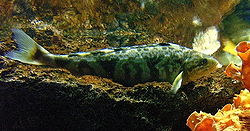𩸽
Translingual
Han character
𩸽 (Kangxi radical 195, 魚+7, 18 strokes, composition ⿰魚花)
References
- Kangxi Dictionary: not present, would follow page 1473, character 27
- Unihan data for U+29E3D
Japanese
Glyph origin
A 国字 (kokuji, “Japanese-coined character”), combining the radical for 魚 (“fish”) with the character for 花 (“flower”).
Kanji
Readings
Etymology

| Kanji in this term |
|---|
| 𩸽 |
| ほっけ Hyōgai |
| kun'yomi |
Unknown. Various possibilities.
- According to legend, the first Japanese person to catch this fish was Buddhist monk Nichiji in the late 1290s, and he named it hokke after the 法華 (Hokke, “Lotus Sutra”).
- May be a shortening of (deprecated template usage) [etyl] Ainu トドホッケ (todo hotke, “sea lions lie down”), the original Ainu name of 椴法華村 (Todohokke Mura, “Todohokke Village”), a village on the coast of Hokkaido where legend tells that Nichiji first caught this fish.
- May be a borrowing from (deprecated template usage) [etyl] Ainu ホッケ (hotke, “to lie down”), possibly from the way that the fish sometimes appears to be lying on the bottom.
Considering that the fish is native to the waters off northern Japan where the Ainu were once prevalent, an Ainu derivation seems most likely.
Pronunciation
Lua error in Module:parameters at line 828: Parameter "yomi" is not used by this template.
Alternative forms
Noun
- a type of fish: Lua error in Module:parameters at line 828: Parameter "noshow" is not used by this template., common names Arabesque greenling and Okhotsk atka mackerel
Usage notes
This kanji appears to have been coined in Japan (kokuji). It is also extremely rare even in Japanese. The alternative kanji spellings are also rare.
As with many terms that name organisms, this term is often spelled in katakana, especially in biological contexts (where katakana is customary), as ホッケ. This is also the most common spelling in general contexts.
References
- Shōgaku Tosho (1988) 国語大辞典(新装版) [Unabridged Dictionary of Japanese (Revised Edition)] (in Japanese), Tōkyō: Shogakukan, →ISBN
Further reading
- Etymology entry for ホッケ at Japan Dictionary: http://nihonjiten.com/data/45707.html
- Translingual lemmas
- Translingual symbols
- Han script characters
- Japanese-coined CJKV characters
- Japanese kanji
- Japanese hyōgai kanji
- Japanese kanji with kun reading ほっけ
- Japanese terms spelled with 𩸽 read as ほっけ
- Japanese terms read with kun'yomi
- Japanese terms with unknown etymologies
- Japanese terms derived from Ainu
- Japanese lemmas
- Japanese nouns
- Japanese terms with multiple readings
- Japanese terms spelled with hyōgai kanji
- Japanese terms with 1 kanji
- Japanese terms spelled with 𩸽
- Japanese single-kanji terms
- Japanese entries with topic categories using raw markup
- Japanese-only CJKV Characters
- ja:Fish
